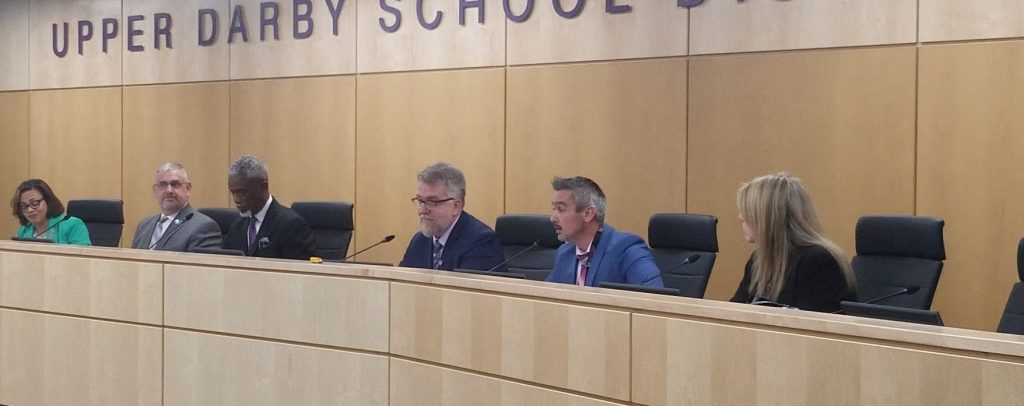UPPER DARBY — Education experts, politicians, and advocates gathered at the Upper Darby School District headquarters to express unanimous backing for a proposed $1.1 billion basic education funding increase outlined in Democratic Gov. Josh Shapiro’s 2024-25 budget proposal.
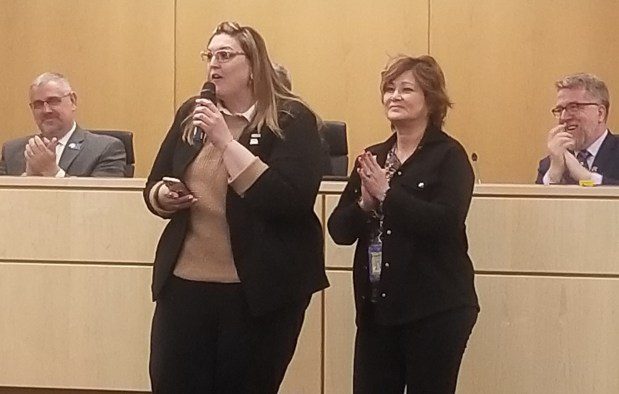
“Gov. Shapiro’s budget proposal marks a pivotal first move towards rectifying our unconstitutional public school funding system,” noted Andrea Fink, head of the William Penn Education Association. “Pennsylvania students have been waiting for decades for policymakers to take decisive action to address the substantial needs in their schools. They cannot wait any longer. We must act.”
Fink, alongside Linda Fox, her counterpart in Upper Darby, emphasized that the teachers union and superintendents are aligned on this issue and urged legislators from both sides to also support the initiative.
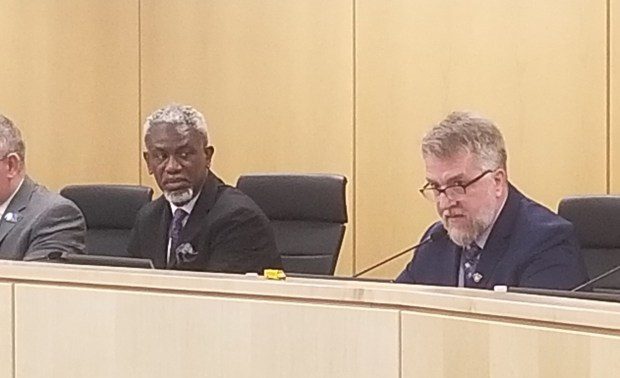
Upper Darby School Board President Don Fields argued that disparities in education funding have compelled districts with fewer resources to devote significantly more time “just treading water” and trying to get through each week than wealthier districts.
“If school districts didn’t have to focus so much on advocacy, they could dedicate more time and effort to education, to devising improved ways to serve and educate our children,” stated Fields. “No one in education chose their profession to spend more time in Washington or Harrisburg pleading for additional funding. Or holding press conferences. They entered this field to serve the public, to serve the future of their community, to make a difference. The primary obstacle to making that difference is funding.”
Shapiro’s proposal would allocate approximately $1 billion to day-to-day district operations, as well as $300 million for school repairs, $100 million for mental health services, $50 million for safety grants, and $20 million to recruit and retain educators, at a time when Pennsylvania is facing a critical teacher shortage. He also aims to establish a cybercharter school tuition rate of $8,000 per student, which is anticipated to save school districts about $262 million overall.
The funds would be sourced from the state’s $14 billion surplus as part of an “ambitious” expenditure for Pennsylvania's finances in the next fiscal year commencing on July 1, as acknowledged by Shapiro during a budget address last month. The proposal signifies a roughly 14% increase over current basic education funding.
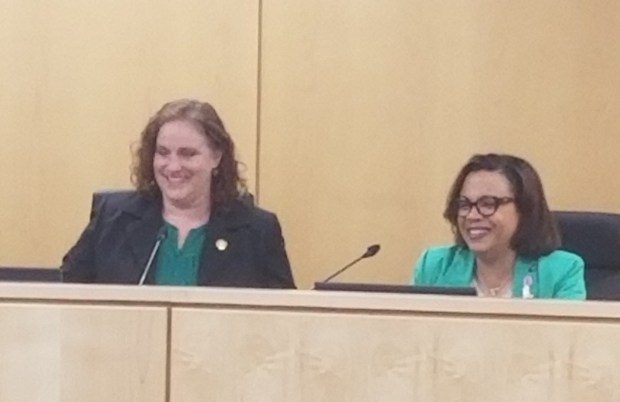
Educators argue that this increase is desperately needed after years of insufficient investment in public schools, which have also been burdened with numerous unfunded mandates, leading to rising costs and teacher exodus.
“I would argue that we are running some of the most complicated organizations in this country, and we are expected to comply with every new regulation and requirement without the proper funding and support,” said Upper Darby School District Superintendent Dr. Daniel McGarry.
Norristown Area School District Superintendent Christopher Dormer said he often hears from lawmakers who say they are tired of hearing about problems and want to hear about solutions.
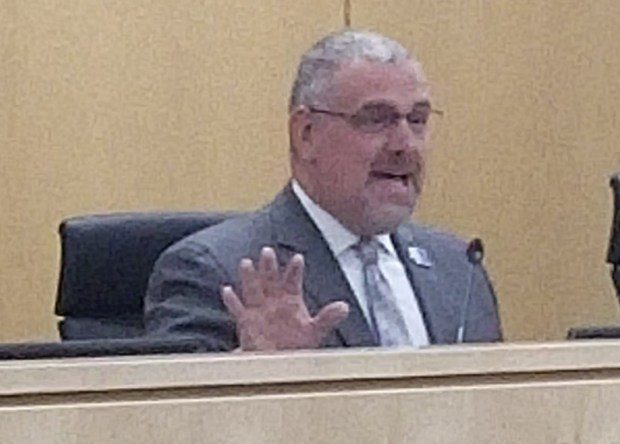
“My response to them is: Solutions require money. Full stop,” he said. “Funding makes a real difference in the lives of our students, in the quality of the programs, materials and supports and environments that we can provide, as well as the volume of opportunities that we can provide to our students.”
Dormer said the state’s charter school law must also be changed to address overpayments of cybercharters serving students from different districts at variable rates. He compared it to customers at a restaurant being charged wildly varying prices for the same hamburger based on nothing but their ZIP code.
Dr. Maria Edelberg, executive director of the Delaware County Intermediate Unit, noted the budget proposal includes increased funding for career and technical education critical for trade and infrastructure jobs.
She said it is equally crucial that the state fund preschool and early childhood education, where resources are often low and needs have skyrocketed.
“Just for the Delaware County Intermediate Unit alone, we have seen a 30% increase in students entering our early intervention program,” she said. “In the 2021-22 school year, we serviced 2,160 children with special needs. This year, we are anticipating serving 3,083 students in special education. These are 3-to-5-year-olds.”
Of like minds
Many of those gathered Thursday pointed to a Supreme Court ruling last year that found Pennsylvania had failed to meet a constitutional obligation to provide a fair and adequate education to all children, saying this was a step in the right direction.
“We have waited 10 years for this ruling, and yet today we are still standing … and fighting to ensure that our students get what they rightfully deserve: An adequate funding for basic education” said Dr. Eric Becoats, superintendent of the William Penn School District, which was a plaintiff in that lawsuit. “There is hope that the recommendation of the Basic Education Funding Commission and Gov. Shapiro’s proposed budget will chart a new historic course for our schools. This can only be accomplished, though, if our state legislators pass this budget in full and complete form. It is imperative for our students, our teachers and our staff, and our families and our communities. We can no longer get by with less, or do more with less.”
State Rep. Heather Boyd, D-163, a former Upper Darby School Board member, said she remembered advocating for increased funding when her kids were aged 2 and 5. They are now 13 and 16, and the older one will have his entire public education underfunded, she said.
“When the governor mentioned $1.1 billion, I shouted,” she said. “The room was filled with shouts because we all remember the $1 billion cuts from two governors ago that we are still feeling. It is still affecting us. … So I hear that number and I’m thrilled, I’m going to support it if it’s in front of me. I’m ready to say yes.”
Boyd warned that there also needs to be a commitment to a larger $5.4 billion seven-year plan to close the education funding gap, or educators and politicians will find themselves back where they are now before too long.
State Rep. Gina Curry, D-164, Upper Darby, a fellow former Upper Darby School Board member, pointed out that this budget, if passed, would have impacts beyond just Delaware County.
“We are trying to have a bipartisan effort to get this budget passed,” she said. “We are proud to stand in the Legislature as former school board directors and parents right here in this district to be able to get this budget passed. Because it makes sense, it is a budget that is going to impact our districts in such a way — our districts down here on the southeastern side of the commonwealth — but not only that, our rural districts that many people don’t talk about where there’s no access and very little money.
“We have a tagline in Upper Darby, you walked right through it when you walked into this room: Opportunity, unity and excellence,” said McGarry. “It’s not a joke. Our goal in the Upper Darby School District is to provide every opportunity for all of our students to be unified in their ability to pursue excellence. Adequate allocation of funding will assist in removing barriers so our talented and dedicated teachers can support students in reaching that goal, that tagline.





